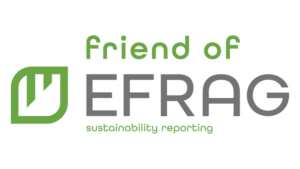Shaping sustainability strategically: Successful implementation of the EcoVadis assessment
Customer: Liebherr-MCCtec GmbH
Category: Crane/ mechanical engineering
The Liebherr-MCCtec GmbH division is part of the globally active Liebherr Group. With innovative products and a high level of vertical integration, the Liebherr division offers customized crane solutions for the construction and energy industries, seaports, shipyards and shipping. Sustainability is an integral part of the corporate strategy – both out of conviction and at the request of global markets and customers.
As part of the continuous development of its sustainability management, Liebherr-MCCtec GmbH has set itself the goal of subjecting the entire division to an EcoVadis rating. This presented a particular challenge – especially due to the complex Group structure with several companies, locations and responsibilities. In order to implement this ambitious project, Liebherr decided to work with DFGE – Institute for Energy, Ecology and Economy, a long-standing partner of EcoVadis with a high level of expertise in the field of sustainability and ESG ratings.
The aim of the project was to create a resilient structure with which the entire division, with its four production sites, could not only successfully pass the EcoVadis assessment, but also professionalize its sustainability strategy in the long term. DFGE supported the implementation and helped to build on the existing initiatives instead of starting from scratch.
Tatjana Grissemann-Peter
Manager Corporate Responsibility, Liebherr-MCCtec GmbH
“We deliberately chose DFGE because it is not only an official and long-standing partner of EcoVadis, but also because it was recommended by our own Group. DFGE brings a deep understanding of the EcoVadis system, combined with a pragmatic way of working that is characterized by medium-sized companies – this fits in perfectly with Liebherr’s culture.”
Challenges
Mastering complexity, structuring sustainability
The implementation of a division-wide EcoVadis assessment presented Liebherr with several key challenges. One of the biggest hurdles was the complex structure within the division. Various companies and locations, which had previously only been assessed individually, now had to be brought together under uniform sustainability standards. This meant not only an organizational coordination effort, but also a high level of internal coordination and knowledge alignment.
In addition, data collection was not centralized in the past – much of the relevant ESG data was only available in isolated cases or in varying quality. There was a lack of uniform KPIs, which are necessary for a consistent sustainability profile.
The situation was further complicated by different levels of knowledge about the EcoVadis system within the stakeholders.
There was uncertainty about how the assessment system worked in detail. At the same time, pressure from customer requirements grew – sustainability certificates were increasingly being requested for tenders. Competing companies were also positioning themselves in the competitive environment with strong sustainability ratings – which further increased the relevance of a good rating.
It was particularly important for Liebherr not to discard its existing sustainability initiatives. Rather, these were to be supplemented in a targeted manner and transferred into a structured overall strategy. In this context, a collaboration was sought that would pick up on existing strengths, identify gaps and at the same time act flexibly and practically – without unnecessarily increasing the effort involved.
Solution
Systematic success – with structure, expertise and a sense of proportion
The focus of the collaboration with DFGE was a targeted and practical approach, which was aimed both at passing the EcoVadis assessment and at providing important impetus for the establishment of a sustainability management system that works in the long term. The assessment process was initiated promptly and structured according to clear priorities.
DFGE provided a precise gap analysis that not only addressed the requirements of EcoVadis, but also showed where the greatest development potential lay. The support provided went far beyond the requirements of a standardized “Corrective Action Plan”. Rather, concrete recommendations for action were formulated, practical tips for optimization were provided and central ESG topics were further developed together with the internal contacts.
A key success factor was support in the expansion and harmonization of guidelines and policies. In addition, DFGE supported the collection of relevant sustainability indicators at divisional level and provided a tried-and-tested template for a central KPI dashboard. This enabled Liebherr to create a standardized database that can be used not only for the EcoVadis rating, but also for future ESG reporting requirements.
Result
Gold for sustainability – and a strong foundation for the future
The joint work between Liebherr-MCCtec GmbH and DFGE led to a measurable and sustainable success: The company division achieved the EcoVadis Gold Medal for the first time – clear evidence of the high level of sustainability management practiced and an important competitive advantage in the international market environment. Liebherr-MCCtec GmbH is thus among the top 5% of all companies rated in EcoVadis within its sector.
In addition, the project has made it possible to build up robust internal knowledge. Employees now have a deeper understanding of ESG requirements and will be able to develop relevant topics independently in the future. This not only strengthens the EcoVadis rating, but also the organization’s overall sustainability profile.
Jan Winkler
Product Manager, Liebherr-Rostock GmbH
“The cooperation with DFGE was not only technically sound, but also very pleasant on a personal level, which is why we were able to recommend them to other Liebherr divisions.”
Conclusion
The case study impressively demonstrates how a complex sustainability project can not only be successfully implemented through professional, pragmatic and collaborative partnership, but can also be used as a basis for long-term ESG excellence. DFGE proved to be the ideal sparring partner for not only thinking strategically about sustainability, but also implementing it in practice. Subsequently, further projects with DFGE for company-wide sustainability were also implemented in other divisions of the Liebherr Group.








